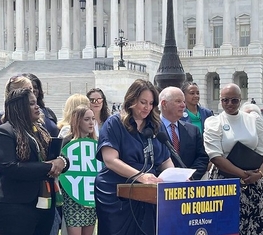Mifepristone: Where Things Stand in the Legal Battle Over Medication Abortion
This blog was written by legal intern Sarah Tibbitts and legal and research fellow Thomas Thai
Mifepristone, a drug commonly used for medication abortion, is under attack in the federal courts. At stake are the rights of women and people who can become pregnant to access one of the most common, effective, and safest forms of abortion. Read on to learn where the case challenging FDA approval of the drug stands today.
What Is Medication Abortion?
Before jumping to the status of the case, let’s talk about medication abortion itself.
For many, the term “abortion” conjures images of operating rooms and doctor’s offices. While surgical abortions certainly happen, over half of all abortions in the United States are medication abortions. Medication abortions typically consist of two pills — mifepristone and misoprostol — which work together to end early pregnancies by blocking the hormone progesterone. Mifepristone received full approval from the Food and Drug Administration (FDA) in 2000 and has been approved for use for up to ten weeks of pregnancy. Abortion medications are incredibly effective in ending early pregnancies, with success rates of 94 – 98% when used correctly in the first eight weeks of pregnancy.
Learn about LWV's work towards reproductive justice and other issues in your community through your local League.
But the future of medication abortion is uncertain, as lawmakers increasingly target mifepristone use to curb, if not fully block, abortion access. The fight against medication abortion came to the forefront this year as both the US Court of Appeals for the Fifth Circuit and the United States Supreme Court heard arguments about access to mifepristone.
When the US Supreme Court ruled in Dobbs v. Jackson Women’s Health Organization that the US Constitution does not confer a right to abortion, the Court overturned decades of precedent from Roe v. Wade and Planned Parenthood v. Casey. Medication abortion’s availability now depends on individual state laws, despite the FDA’s longstanding approval of mifepristone. In the year following Dobbs, individual states have restricted access to medication abortion, with some states attempting to ban it altogether.
The Case Against Mifepristone: Alliance for Hippocratic Medicine v. FDA
The Alliance for Hippocratic Medicine (AHM) is a collective of anti-abortion organizations that sued to revoke the FDA’s approval of mifepristone in November 2022. AHM claimed mifepristone could lead to complications or “incomplete abortions,” and that health care professionals could be forced to use the drug to treat patients or “complete...abortion[s]” even if it was against their personal moral or religious beliefs. These anti-abortion plaintiffs also claimed that mifepristone received “accelerated approval” by the FDA and thus had not been fully assessed for risks and benefits.

This is false. Mifepristone has been an approved and widely used drug for over two decades since the FDA approved the medication in 2000. It had already been approved by numerous countries, including China, the UK, and Sweden, as early as the late-20th century. Before being approved by the FDA, the drug went through three rounds of reviews over four years.
April 7, 2023: Federal District Court Judges Make Opposing Rulings on Mifepristone
On April 7, 2023, a federal district court judge in Texas in Alliance for Hippocratic Medicine v. FDA revoked the FDA’s approval of mifepristone, declaring the agency had “improperly approved the drug.” Almost immediately thereafter, a federal district court judge in Washington issued a contrary ruling upholding FDA approval of mifepristone. The Biden Administration sought an emergency stay of the Texas district court’s injunction — meaning a pause on the order going into effect immediately.
On April 12, the Fifth Circuit issued a ruling on the emergency stay, partially pulling back on the Texas ruling while still placing some limitations on the availability of mifepristone. This decision was based on the statute of limitations for challenging the FDA’s approval of mifepristone having long run out.
The Fifth Circuit ruled that mifepristone could continue to be used, but only through seven weeks of pregnancy — despite the FDA’s approval of usage through ten weeks of pregnancy. In addition, the Fifth Circuit order would require the FDA to reinstate several old restrictions on mifepristone that had been removed in 2016.
Further, under the Fifth Circuit’s order, mifepristone could not be prescribed by mail, and recipients had to physically travel to a doctor’s office to receive the medication. This created an additional barrier for people without cars, patients in rural areas, and working people for whom visiting a doctor’s office during the day is highly inconvenient and time-consuming.
April 21, 2023: The Supreme Court Weighs In
On behalf of the FDA, the federal government sought an emergency stay of the Fifth Circuit’s ruling to the United States Supreme Court. On April 21, 2023, the Supreme Court stayed the district court’s preliminary injunction.
In doing so, the Court blocked the two lower court decisions that would have immediately limited access to mifepristone, maintaining the status quo for now — and leaving the case in the hands of the Fifth Circuit Court of Appeals. Justices Thomas and Alito dissented, stating they would have denied the stay of the lower courts’ decisions, immediately removing access to mifepristone.
May 17, 2023: Fifth Circuit Hears Arguments for Temporarily Pulling Mifepristone Off Market
On May 17, 2023, a Fifth Circuit panel made up of different judges than the emergency hearing heard oral arguments about mifepristone’s availability.

August 16, 2023: Fifth Circuit Rules
On August 16, 2023, the three-judge panel of the US Court of Appeals for the Fifth Circuit that heard oral arguments in May issued its ruling. In a 2 – 1 vote, the panel ruled that the plaintiffs’ challenge to mifepristone’s original approval in 2000 was untimely. But the panel reinstated several restrictions on mifepristone that the FDA had loosened or abolished in 2016 and 2021.
What Does This All Mean for Access to Mifepristone?
Access to mifepristone remains unchanged because of the US Supreme Court’s April 21, 2023, order staying the Texas district court’s preliminary injunction. Mifepristone will remain available until the US Supreme Court makes a final ruling on the FDA’s approval of the drug.
The federal government — representing the FDA — will likely appeal the Fifth Circuit’s August 16 decision to the Supreme Court. If the Supreme Court accepts a review of the case, which is likely, the case would be heard during the Court’s upcoming October 2023 term, and a decision could be made as soon as the end of June 2024. At that time, a decision would take effect.
If the Supreme Court makes mifepristone less accessible, this will have far-reaching effects for countless people who can become pregnant — especially those living in areas far from surgical abortion centers — creating yet another barrier to reproductive freedom.
What Can I Do About It?
While we wait for a decision to come down in Alliance for Hippocratic Medicine v. FDA, it's important to stay vigilant about other restrictions and decisions around reproductive access. Many states are facing legal challenges, such as abortion bans, and clinics that provide abortion services have been closing across the country. So, what can you do?
To support abortion seekers and providers directly, you can donate to local abortion funds. Many desperately need financial support; if you cannot give financially, reach out and see if you can help as an in-person volunteer.
You can also support abortion rights by voting for politicians who value reproductive freedom. Be aware of elections! Some states also have ballot initiatives around abortion access. Ensure your voter registration is updated, you know what issues are on the ballot, and you have the proper ID you need to vote in your state. Check your registration and find out where your candidates stand at VOTE411.org.
Contact your representatives! Let them know you’re passionate about safe and accessible reproductive access for everyone.
The Latest from the League
From January – August 2023, state legislatures nationwide passed various bills into law. While following these developments, the League noticed several important trends around voting rights and election administration.
There is only one way we can ensure that the promise of democracy is kept: by fervently participating in our nation’s political processes, ensuring our voices are heard.
Without the ability to make reproductive decisions for one’s body, those who can become pregnant cannot participate equally in our democracy.
Further, since the Dobbs decision reversing the right to abortion, numerous state governments have introduced legislation directly or indirectly related to reproductive rights, challenging doctrines of US democracy.
Sign Up For Email
Keep up with the League. Receive emails to your inbox!
Donate to support our work
to empower voters and defend democracy.






_3.png?itok=nfJjspjp)